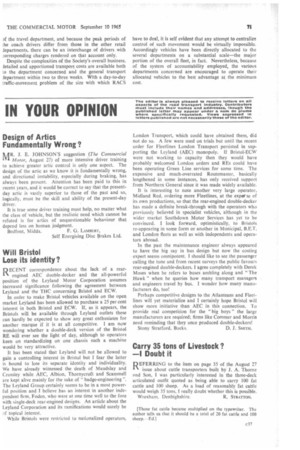Will Bristol Lose its identity?
Page 73

If you've noticed an error in this article please click here to report it so we can fix it.
RECENT correspondence about the lack of a rear" engined AEC double-decker and the all-powerful position of the Leyland Motor Corporation assumes increased significance following the agreement between Leyland and the THC concerning Bristol and ECW.
In order to make Bristol vehicles available on the open market Leyland has been allowed to purchase a 25 per cent interest in both Bristol and ECW. If, as it appears, the Bristols will be available through Leyland outlets these can hardly be expected to show any great enthusiasm for another marque if it is at all competitive. I am now wondering whether a double-deck version of the Bristol RE will ever see the light of day, although to operators keen on standardizing on one chassis such a machine would be very attractive.
It has been stated that Leyland will not be allowed to gain a controlling interest in Bristol but I fear the latter is bound to lose its separate identity and individuality. We have already witnessed the death of Maudslay and Crossley while AEC, Albion, Thornycroft and Scammell are kept alive mainly for the sake of " badge-engineering ". The Leyland Group certainly seems to be in a most powerful position and I believe has an interest in another independent firm, Foden, who were at one time well to the fore with single-deck rear-engined designs. An article about the Leyland Corporation and its ramifications would surely be A topical interest.
While Bristols were restricted to nationalized operators, London Transport, which could have obtained them, did not do so. A few were used on trials but until the recent order for Fleetlines London Transport persisted in supporting the Leyland (AEC) monopoly. If Bristol-ECW were not working to capacity then they would have probably welcomed London orders and REs could have been operating Green Line services for some time. The expensive and much-overrated Routemaster, basically lengthened in some instances, has only received support from Northern General since it was made widely available.
It is interesting to note another very large operator, Midland Red, ordering more Fleetlines, at the exper se of its own productions, so that the rear-engined double-decker has made a definite break-through with the operators who previously believed in specialist vehicles, although in the wider market Southdown Motor Services has yet to be convinced. I look forward, optimistically, to Bristols re-appearing in some form or another in Municipal. B.E.T. and London fleets as well as with independents and operators abroad.
In the past the maintenance engineer always appeared to have the big say in bus design but now the costing expert seems omnipotent. I should like to see the passenger calling the tune and from recent surveys the public favours rear-erigined double-deckers. I agree completely with Derek Moses when he refers to buses ambling along and "The Hawk" when he queries how many transport managers and engineers travel by bus. I wonder how many manufacturers do, too!
Perhaps competitive designs to the Atlanteans and Fleetlines will yet materialize and I certainly hope Bristol will show more initiative than AEC in this connection. To provide real competition for the "big boys" the large manufacturers are required; firms like Commer and Morris need reminding that they once produced double-deckers!
Stony Stratford. Bucks. D. J. SMITH.
























































































































